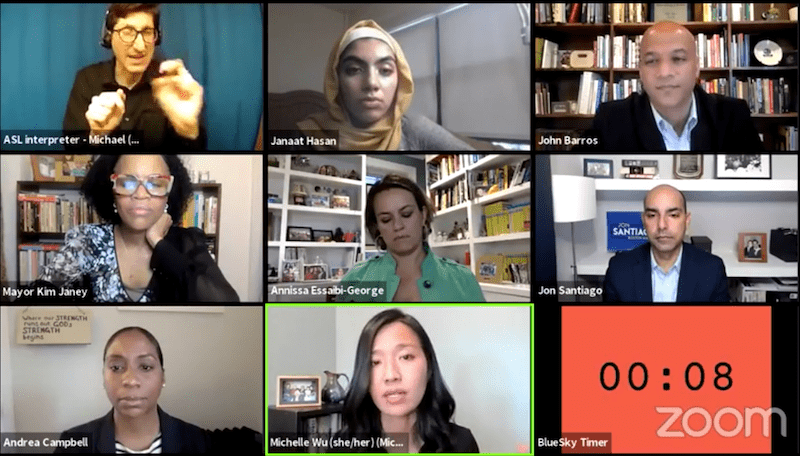Mayoral candidates face an electorate that’s moving to the left
More voters backing rent control, elected school committee

Recent polling has painted a picture of a Boston electorate ready to embrace progressive change, showing that 76% of voters support rent control, 60% want an elected school committee and 48% support reducing spending on police and investing the savings in anti-violence and social service programs, versus 36% who oppose such a move.
Yet among the six candidates running for mayor, support for those three positions is lacking. Only Wu supports rent control, none supports a fully elected school committee and Essaibi George, Barros and Santiago have voiced varying degrees of opposition to police reforms backed by Progressive Massachusetts chapters.
“I think a lot of elected officials are out of touch with the voting population,” said political organizer Anthony Collins. “So many of them think this is the same electorate that was there when they were first elected.”
Collins cites George Floyd’s murder and four years of the Trump presidency as factors that have pushed the electorate to the left side of the political spectrum. In last year’s U.S. Senate election, a youth-led movement helped incumbent Sen. Ed Markey fend off a challenge from former Rep. Joseph Kennedy III.
Perhaps more importantly, the share of the electorate made up of voters between the ages 18 and 24 rose from little more than 6.7% in 2018 to 20.9% in 2020. Those voters face challenges that include student debt and housing prices beyond their means — challenges many of the candidates running for mayor weren’t confronted with.
Collins points to the 2020 presidential primary, where votes for Bernie Sanders and Elizabeth Warren together were nearly twice the votes the more moderate Joe Biden secured.
“People don’t understand there’s a strong left-leaning vote in Boston,” Collins said.
Three chapters of Progressive Massachusetts — JP Progressives, Progressive West Roxbury/Roslindale and Downtown Progressives — teamed up to ask candidates a range of questions on issues including police reform, housing and education. Among the candidates, Michelle Wu came closest to backing the groups’ progressive agenda.
Prominent among progressives’ concerns is police reform.
Alex Ponte Capellan, an organizer with the housing justice group City Life/Vida Urbana, wants to see the Boston Police Department’s budget slashed and its gang database dismantled. The organizer said police added his name to the list more than 10 years ago after he was in a confrontation with a group of youth the officers considered a gang, and said police aren’t really capable of preventing crime.
“I think the city is putting resources and energy into the wrong things,” he said. “If we want safer communities, we should be putting resources into things like housing and education.”
Ponte Capellan’s call for a cut to the police budget is shared by nearly half of Boston voters, according to a Poll Progressive survey released last week.
But the appetite for cutting the police budget is not universally shared among mayoral candidates. While five of the six candidates running for mayor told Progressive Massachusetts members they support reducing funding for police, Andrea Campbell was the only candidate who answered the question “How much?” She committed to the same 10% cut that she, along with now-acting Mayor Kim Janey and at-large Councilor Michelle Wu, advocated for last year.
When it comes to shuttering the BPD gang database, Annissa Essaibi George, John Barros and Jon Santiago said no to dismantling the controversial gang database, which critics say has often inaccurately labeled as gang members children who have no criminal involvement with gangs, on at least one occasion resulting in a child’s deportation.
Santiago, a state representative and emergency room doctor, went further than any other candidate in opposing police reforms, saying no to a requirement that the Boston Police Department obtain approval from the City Council before purchasing surveillance technology, opposing a cap on police overtime and responding “no” when asked whether he supported Suffolk County District Attorney Rachael Rollins’ decision to not prosecute minor nonviolent crimes (on the latter question, Santiago said he agreed with much of Rollins’ list of crimes that should not be prosecuted, but did not specify which crimes should be prosecuted).
Andrea James, founder of Families for Justice as Healing, said her organization is looking very closely at how candidates are responding to calls for criminal justice reform.
“We intend on this being a very important issue in the mayor’s race,” she said. “We’re organizing around this issue. We’re looking for firm commitments.”
On education, Barros and Campbell voiced opposition to limiting charter school expansion in Boston. Last week, the Boston Globe reported that the funders of a political action committee that has raised $660,000 in support of Campbell include many backers of the failed 2016 ballot question to lift the statewide cap on charters.
While Barros and Campbell said they would support changing the admissions policies for the city’s three selective high schools, both also said they support continuing to use an entrance examination for admissions.
Four candidates voiced support for a hybrid part-elected, part-appointed School Committee. Barros and Campbell said they would support keeping the body entirely appointed.
Although voters weren’t polled on the hybrid model, some education activists argue that it would undermine Boston residents’ call for more democracy.
“A hybrid model is not an elected school committee,” said Boston Education Justice Alliance Executive Director Ruby Reyes. “There’s still mayoral control over the decision-making process.”






